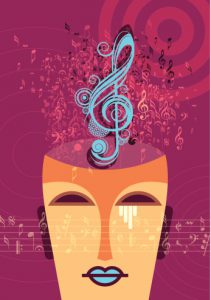Music has been known to make us smile, excite us, make us dance or bring us to tears. It can bring back a memory so vividly that we actually feel we are there.
Music can stabilize or have an enhancing effect on our mood, but how does it have this profound power over a person’s emotions?
Maybe because it is a common phenomenon that crosses all boarders of nationality, race and culture. Music is often used as a tool for arousing feelings and can be far more impactful than language.
Did you know that when we listen to a musical rhythm, our heart can actually begin to synch with it? Studies have shown that a “major key” will signify cheerful communication to our brain, while a “minor key” can bring on sighs and lamentations. All of this has an effect on the brain, which directs our psyche to feel what’s being communicated to us.
In many instances, music is utilized for treating depressed or anxious patients since the meter, timber, rhythm and pitch of musical arrangements are managed in areas of the brain that deal with emotions and mood.
Although the overall phenomenon still has its certain level of mystery, many people turn to music for a general sense of well-being.
All content of this newsletter is intended for general information purposes only and is not intended or implied to be a substitute for professional medical advice, diagnosis or treatment. Please consult a medical professional before adopting any of the suggestions on this page. You must never disregard professional medical advice or delay seeking medical treatment based upon any content of this newsletter. PROMPTLY CONSULT YOUR PHYSICIAN OR CALL 911 IF YOU BELIEVE YOU HAVE A MEDICAL EMERGENCY.




